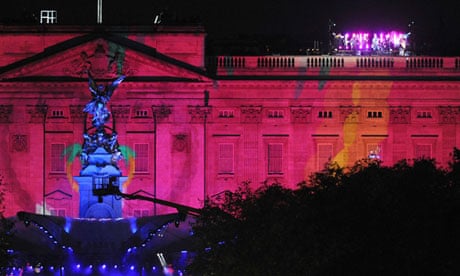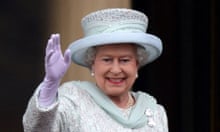In recent weeks, it has been pointed out more than once that during the Queen's silver jubilee in 1977, the only real role pop music had to play was as a lightning rod for anti-royalist sentiment. The kind of people that like to believe that rock and pop has lost its counter-cultural edge in the interim have been heard to bemoan how different things are today than in the halcyon era of the Sex Pistols' God Save the Queen.
Nevertheless, there were moments during the diamond jubilee concert, particularly in its early stages, where you began to wonder if the whole event hadn't been put together with slightly more seditious intent than its organiser was being given credit for. JLS, Jools Holland, something the compere referred to as "another head-turning performance from Jessie J" – you occasionally began to wonder if Gary Barlow was trying to bore the assembled members of the royal family into submission. You half-expected Take That's frontman to run on-stage in one of those V for Vendetta masks and start addressing the royal box in a threatening fashion: "ABDICATE NOW, OR I'LL SING ANOTHER DUET WITH CHERYL COLE."
But the Windsors are made of stern stuff. Throughout it all, they wore the inscrutable expressions that have seen them through decades of opening leisure centres, being shown around factories and, indeed, of the royal variety performance. It was a look that announced that, when it came to the stoic endurance of boring events, the undisputed champions were in town. It was a look that said, come on Barlow, do your worst. Hit us with another head-turning performance from Jessie J, see if one flinches. They even laughed at the various comperes' jokes, which suggested an almost superhuman degree of forbearance, because they made you want to weep for mercy: "If I had a pound for every time someone mentioned the Olympics I could almost afford a ticket."
To be fair to the organisers, the jubilee concert is a tough gig. For all the sniping about the lack of a latterday punk, pop music and the royal family are still a tricky fit, something you could tell just looking at the audience, who looked less like gig-goers than the denizens of Henman Hill. It may indeed have lost the power to shock it once possessed, but at the very least pop music is still supposed to be irreverent, and the diamond jubilee is, by definition, an event entirely about reverence: "I hope you feel that outpouring of love, ma'am," offered Rolf Harris, somehow managing to distinguish himself as a little too obsequious in an evening that also featured Stevie Wonder changing the words of Isn't She Lovely to address HM and Annie Lennox performing There Must Be An Angel Playing With My Heart to a backdrop of footage from the Queen's life. Enough anti-establishment sentiment still exists in rock that it was possible to be struck by the absence not merely of anything from the cutting edge – only a lunatic would tune into the Queen's diamond jubilee concert expecting to hear that – but vast swaths of mainstream classic rock and pop: no Paul Weller or Morrissey, no Noel Gallagher or Blur, no Stone Roses or indeed Rolling Stones.
The Queen wisely gave the first hour and half a miss, which meant she got there in time for most of the good stuff. It tended to come from the elder statesmen and women. Elton John, Paul McCartney, Shirley Bassey and Wonder have been playing to audiences the size of the one that thronged the Mall for the majority of the Queen's reign: they have the triple-tested hits – Your Song, Sir Duke, All My Loving, Diamonds Are Forever – they know how to work a huge crowd.
Despite the best efforts of Grace Jones – her usual impersonation of a woman temporarily evading the clutches of a group of psychiatric nurses augmented by the presence of a hula hoop that she somehow managed to keep in motion throughout Slave to the Rhythm – its real highlight might have been Madness, performing Our House and It Must Be Love on top of Buckingham Palace. It looked genuinely spectacular, a solitary moment that even the most implacable opponent of the monarchy might have felt themselves softening at least a little to the event.






Comments (…)
Sign in or create your Guardian account to join the discussion